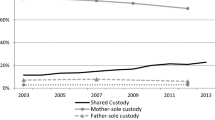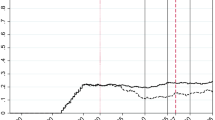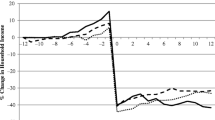Abstract
Economic hardship among divorced women—particularly mothers—is a longstanding policy concern. Most research in this area has causally examined women’s labor supply in relation to divorce or concentrated on post-divorce outcomes alone. Less attention has been paid to understanding mothers’ pre-divorce economic outcomes, although they have an important bearing on their post-divorce economic circumstances. The present study addresses this gap by using court records data on divorce cases linked to administrative employment records in Wisconsin to examine economic circumstances of married mothers with children at the time of filing the divorce petition, and how they evolve over three years leading up to it. The study introduces a new measure of economic vulnerability and carries out a descriptive analysis of mothers’ employment, earnings, and economic circumstances in the years preceding a divorce and compares them with the outcomes of fathers. Results show that despite significant increases in labor supply and earnings in the time leading up to divorce, mothers remain economically more vulnerable than fathers going into divorce, with over 44% of mothers (compared to 27% fathers) unable to support themselves and their children above the poverty line with their own earnings. Findings also suggest that mothers with younger children are worse off in terms of earnings and employment than mothers of older children although such differences are less pronounced for fathers. Implications for post-divorce cost-sharing of children, work, and safety net policies are discussed.




Similar content being viewed by others
Data Availability
The data that support the findings of this study are housed at the Institute for Research on Poverty; data have been provided by state agencies and are subject to data use restrictions and prior authorization requirements. Researchers with access to state administrative data complete data security training and sign a confidentiality agreement. IRP programming staff merge confidential data and provide datasets for analysis with personal identifiers removed. Data is stored and analyzed on a secure server.
References
2022 State of the Gender Pay Gap Report. (2022, March 14). Payscale. https://www.payscale.com/research-and-insights/gender-pay-gap/
Amato, P. R. (2000). The consequences of divorce for adults and children. Journal of Marriage and Family, 62(4), 1269–1287. https://doi.org/10.1111/j.1741-3737.2000.01269.x
Ananat, E. O., & Michaels, G. (2008). The effect of marital breakup on the income distribution of women with children. The Journal of Human Resources, 43(3), 611–629.
Bargain, O., González, L., Keane, C., & Özcan, B. (2012). Female labor supply and divorce: New evidence from Ireland. European Economic Review, 56(8), 1675–1791. https://doi.org/10.1016/j.euroecorev.2012.08.007
Bartfeld, J. (2000). Child support and the postdivorce economic well-being of mothers, fathers, and children. Demography, 37(2), 203–213. https://doi.org/10.2307/2648122
Bartfeld, J., Ahn, H.-M., & Ryu, J. H. (2012). Economic well-being of divorced mothers with varying child placement arrangements in Wisconsin: Contributions of child support and other income sources. Institute for Research on Poverty. University of Wisconsin-Madison. https://www.irp.wisc.edu/resource/economic-well-being-of-divorced-mothers-with-varying-child-placement-arrangements-in-wisconsin-contributions-of-child-support-and-other-income-sources/
Becker, G. (1981). A treatise on the family (Enlarged). Harvard University Press.
Bianchi, S. M., Subaiya, L., & Kahn, J. R. (1999). The gender gap in the economic well-being of nonresident fathers and custodial mothers. Demography, 36(2), 195–203. https://doi.org/10.2307/2648108
Blau, F. D., & Kahn, L. M. (2017). The gender wage gap: Extent, trends, & explanations. Journal of Economic Literature, 55(3), 789–865. https://doi.org/10.1257/jel.20160995
Blau, F. D., & Winkler, A. E. (2017). Women, work, and family. In S. L. Averett, L. M. Argys, & S. D. Hoffman (Eds.), The Oxford Handbook of Women and the Economy. Oxford Handbooks. https://doi.org/10.1093/oxfordhb/9780190628963.013.16
Bonnet, C., Garbinti, B., & Solaz, A. (2020). The flip side of marital specialization: The gendered effect of divorce on living standards and labor supply. Journal of Population Economics. https://doi.org/10.1007/s00148-020-00786-2
Brown, P. R., Thornton, K., Ross, D., Smith, J. A., & Wimer, L. (2020). Technical report on lessons learned in the development of the institute for research on poverty’s Wisconsin administrative data core [Technical Report]. Institute for Research on Poverty, University of Wisconsin-Madison.
Budig, M. J., & England, P. (2001). The wage penalty for motherhood. American Sociological Review, 66(2), 204–225. https://doi.org/10.2307/2657415
Cancian, M., Meyer, D. R., Brown, P. R., & Cook, S. T. (2014). Who gets custody now? Dramatic changes in children’s living arrangements after divorce. Demography, 51(4), 1381–1396. https://doi.org/10.1007/s13524-014-0307-8
Davies, R., & Pierre, G. (2005). The family gap in pay in Europe: A cross-country study. Labour Economics, 12(4), 469–486. https://doi.org/10.1016/j.labeco.2005.05.003
de Vaus, D., Gray, M., Qu, L., & Stanton, D. (2017). The economic consequences of divorce in six OECD countries. Australian Journal of Social Issues, 52(2), 180–199. https://doi.org/10.1002/ajs4.13
Dotti Sani, G. M. (2015). Within-couple inequality in earnings and the relative motherhood penalty. A cross-national study of European countries. European Sociological Review, 31(6), 667–682. https://doi.org/10.1093/esr/jcv066
Fisher, H., & Low, H. (2016). Recovery from divorce: Comparing high and low income couples. International Journal of Law, Policy and the Family, 30(3), 338–371. https://doi.org/10.1093/LAWFAM/EBW011
Gadalla, T. M. (2008). Gender differences in poverty rates after marital dissolution: A longitudinal study. Journal of Divorce & Remarriage, 49(3–4), 225–238. https://doi.org/10.1080/10502550802222493
Gadalla, T. M. (2009). Impact of marital dissolution on men’s and women’s incomes: A longitudinal study. Journal of Divorce & Remarriage, 50(1), 55–65. https://doi.org/10.1080/10502550802365714
Gangl, M., & Ziefle, A. (2009). Motherhood, labor force behavior, and women’s careers: An empirical assessment of the wage penalty for motherhood in Britain, Germany, and the United States. Demography, 46(2), 341–369. https://doi.org/10.1353/dem.0.0056
Goldin, C. (2006). The quiet revolution that transformed women’s employment, education, and family. American Economic Review, 96(2), 1–21. https://doi.org/10.1257/000282806777212350
Greene, W. H., & Quester, A. O. (1982). Divorce risk and wives’ labor supply behavior. Social Science Quarterly, 63(1), 16–27.
Hogendoorn, B. (2022). Why do socioeconomic differences in women’s living standards converge after union dissolution? European Journal of Population. https://doi.org/10.1007/S10680-022-09620-9
Holden, K. C., & Smock, P. J. (1991). The economic costs of marital dissolution: Why do women bear a disproportionate cost? Annual Review of Sociology, 17, 51–78. https://doi.org/10.1146/annurev.so.17.080191.000411
Johnson, W. R., & Skinner, J. (1986). Labor supply and marital separation. The American Economic Review, 76(3), 455–469.
Johnson, W. R., & Skinner, J. (1988). Accounting for changes in the labor supply of recently divorced women. The Journal of Human Resources, 23(4), 417–436.
Kalmijn, M., Loeve, A., & Manting, D. (2007). Income dynamics in couples and the dissolution of marriage and cohabitation. Demography, 44(1), 159–179. https://doi.org/10.1353/dem.2007.0005
Kapelle, N., & Baxter, J. (2020). Marital dissolution and personal wealth: Examining gendered trends across the dissolution process. Journal of Marriage and Family, 83(1), 243–259. https://doi.org/10.1111/jomf.12707
Katz, J., & Bradbury, K. (2002). Women’s labor market involvement and family income mobility when marriages end. New England Economic Review, Q, 4, 41–74.
Killewald, A. (2016). Money, work, and marital stability. American Sociological Review, 81(4), 696–719. https://doi.org/10.1177/0003122416655340
Killewald, A., & García-Manglano, J. (2016). Tethered lives: A couple-based perspective on the consequences of parenthood for time use, occupation, and wages. Social Science Research, 60, 266–282. https://doi.org/10.1016/j.ssresearch.2016.03.007
Kochhar, R., Parker, K., Lopez, H., Deane, C., Brown, A., Keegan, M., Kent, D., & Suh, M. (2015). Three-in-ten US jobs are held by the self-employed and the workers they hire. Pew Research Center.
Leopold, T. (2018). Gender differences in the consequences of divorce: A study of multiple outcomes. Demography, 55(3), 769–797. https://doi.org/10.1007/s13524-018-0667-6
Leopold, T., & Kalmijn, M. (2016). Is divorce more painful when couples have children? Evidence from long-term panel data on multiple domains of well-being. Demography, 53(6), 1717–1742. https://doi.org/10.1007/s13524-016-0518-2
Lundberg, S., & Rose, E. (2000). Parenthood and the earnings of married men and women. Labour Economics, 7(6), 689–710. https://doi.org/10.1016/S0927-5371(00)00020-8
Malcolm, M., & Abdurrahman, Z. (2014). The high cost of specialization: Labor market outcomes following divorce. Review of Applied Economics, 10, 1–19.
Manser, M., & Brown, M. (1980). Marriage and household decision-making: A bargaining analysis. International Economic Review, 21(1), 31–44.
McDowell, E. (2020, July 30). 13 surprising facts about divorce in the US. Business Insider. https://www.businessinsider.com/alarming-facts-about-divorce-in-the-us
Mcelroy, M. B., & Horney, M. J. (1981). Nash-bargained household decisions: Toward a generalization of the theory of demand. International Economic Review, 22(2), 333–349.
Mortelmans, D. (2020). Economic consequences of divorce: a review. In M. Kreyenfeld & H. Trappe (Eds.), Parental life courses after separation and divorce in Europe (pp. 23–41). Springer International Publishing. https://doi.org/10.1007/978-3-030-44575-1_2
Musick, K., Bea, M. D., & Gonalons-Pons, P. (2020). His and her earnings following parenthood in the United States, Germany, and the United Kingdom. American Sociological Review, 85(4), 639–674. https://doi.org/10.1177/0003122420934430
Ortiz-Ospina, E., & Roser, M. (2020, July 25). Marriages and divorces. Our World in Data. https://ourworldindata.org/marriages-and-divorces
Parkman, A. M. (1992). Unilateral divorce and the labor-force participation rate of married women. The American Economic Review, 82(3), 671–678.
Rosenfeld, M. J. (2018). Who wants the breakup? Gender and breakup in heterosexual couples. In D. Alwin, D. Femlee, & D. Kreager (Eds.), Social networks and the life course (Vol. 2, pp. 221–243). Springer. https://doi.org/10.1007/978-3-319-71544-5_11
Sayer, L. C., England, P., Allison, P. D., & Kangas, N. (2011). She left, he left: How employment and satisfaction affect women’s and men’s decisions to leave marriages. American Journal of Sociology, 116(6), 1982–2018. https://doi.org/10.1086/658173
Schwartz, C. R., & Gonalons-Pons, P. (2016). Trends in relative earnings and marital dissolution: Are wives who outearn their husbands still more likely to divorce? RSF, 2(4), 218–236. https://doi.org/10.7758/rsf.2016.2.4.08
Sebelius, K. (2010, July 30). 2010 Poverty Guidelines, Federal Register Notice. Office of the Assistant Secretary for Planning and Evaluation. https://aspe.hhs.gov/2010-poverty-guidelines-federal-register-notice
Stevenson, B. (2008). Divorce law and women’s labor supply. Journal of Empirical Legal Studies, 5(4), 853–873. https://doi.org/10.1111/j.1740-1461.2008.00143.x
Tach, L. M., & Eads, A. (2015). Trends in the economic consequences of marital and cohabitation dissolution in the United States. Demography, 52(2), 401–432. https://doi.org/10.1007/s13524-015-0374-5
Tamborini, C. R., Couch, K. A., & Reznik, G. L. (2015). Long-term impact of divorce on women’s earnings across multiple divorce windows: A life course perspective. Advances in Life Course Research. https://doi.org/10.1016/j.alcr.2015.06.001
Tamborini, C. R., Iams, H. M., & Reznik, G. L. (2012). Women’s earnings before and after marital dissolution: Evidence from longitudinal earnings records matched to survey data. Journal of Family and Economic Issues, 33(1), 69–82. https://doi.org/10.1007/S10834-011-9264-1
Thielemans, G., & Mortelmans, D. (2018). Female labour force participation and divorce: Untangling causes and consequences. Journal of Family and Economic Issues. https://doi.org/10.1007/s10834-018-9600-9
U.S. Census Bureau. (2020). Employment status of people by presence and age of own children, sex, race, Hispanic or Latino ethnicity, and marital status, Annual Average 2020. In Current Population Survey. Bureau of Labor Statistics. United States Census Bureau.
Wolfe, J. D., & Thomeer, M. B. (2021). Divorce, economic resources, and survival among Older Black and White Women. Journal of Marriage and Family, 83(1), 173–190. https://doi.org/10.1111/jomf.12702
Acknowledgements
The research reported here was supported in part by the Child Support Research Agreement between the Wisconsin Department of Children and Families and the Institute for Research on Poverty at the University of Wisconsin-Madison. The author of this article is solely responsible for the content. The author would like to thank the Wisconsin Department of Children and Families and Department of Workforce Development for the use of data for these analyses, but these agencies do not certify the accuracy of the data presented. Views expressed are those of the author and not necessarily the sponsoring institution. The author is grateful to Dr. Judith Bartfeld, several seminar and conference participants, and anonymous reviewers for valuable feedback at every stage of developing this manuscript.
Funding
Funding was provided by Wisconsin Department of Children and Families (Grant no. 437004-A19-0001350-000-01).
Author information
Authors and Affiliations
Corresponding author
Ethics declarations
Conflict of interest
The author has no competing interests to declare that are relevant to the content of this article.
Ethical Approval
This study was approved by the Institutional Review Board of the University of Wisconsin Madison and deemed exempt from informed consent due to reliance solely on administrative data.
Consent for Publication
The author confirms that I have given due consideration to the protection of intellectual property associated with this work and that there are no impediments to publication. The work submitted has not been published previously. It is not under consideration for publication elsewhere, and, if accepted, it will not be published elsewhere without the copyright holder’s written consent.
Consent to Participate
Not applicable.
Additional information
Publisher's Note
Springer Nature remains neutral with regard to jurisdictional claims in published maps and institutional affiliations.
Rights and permissions
Springer Nature or its licensor (e.g. a society or other partner) holds exclusive rights to this article under a publishing agreement with the author(s) or other rightsholder(s); author self-archiving of the accepted manuscript version of this article is solely governed by the terms of such publishing agreement and applicable law.
About this article
Cite this article
Chanda, T. Economic Wellbeing and Labor Supply Patterns of Subsequently Divorcing Mothers in Wisconsin. J Fam Econ Iss 44, 821–835 (2023). https://doi.org/10.1007/s10834-022-09875-8
Accepted:
Published:
Issue Date:
DOI: https://doi.org/10.1007/s10834-022-09875-8




